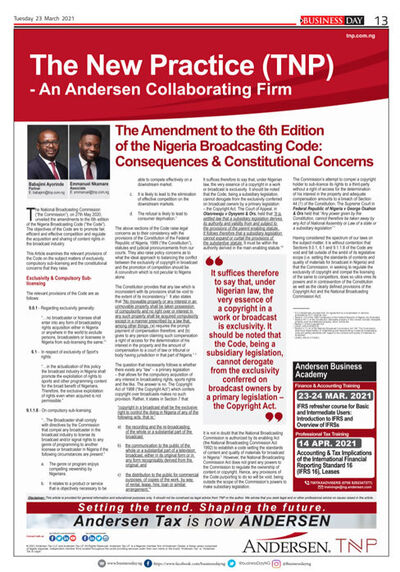The National Broadcasting Commission (“the Commission”), on 27th May 2020, unveiled the amendments to the 6th edition of the Nigeria Broadcasting Code (“the Code”). The objectives of the Code are to promote fair, efficient and effective competition and regulate the acquisition and sharing of content rights in the broadcast industry.
This Article examines the relevant provisions of the Code on the subject matters of exclusivity, compulsory sub-licensing and the constitutional concerns that they raise.
Exclusivity & Compulsory Sublicensing
The relevant provisions of the Code are as follows:
9.0.1 - Regarding exclusivity generally: “…no broadcaster or licensee shall enter into any form of broadcasting rights acquisition either in Nigeria or anywhere in the world to exclude persons, broadcasters or licensees in Nigeria from sub-licensing the same.”1
6.1 - In respect of exclusivity of Sport’s rights:
“…in the actualization of this policy the broadcast industry in Nigeria shall promote the exploitation of rights to sports and other programming content for the broad benefit of Nigerians. Therefore, the exclusive exploitation of rights even when acquired is not permissible.”
9.1.1.8 - On compulsory sub-licensing: “...The Broadcaster shall comply with directives by the Commission that compel any broadcaster in the broadcast industry to license its broadcast and/or signal rights to any genre of programming to another licensee or broadcaster in Nigeria if the following circumstances are present:”
a. The genre or program enjoys compelling viewership by Nigerians.
b. It relates to a product or service that is objectively necessary to be able to compete effectively on a downstream market.
c. It is likely to lead to the elimination of effective competition on the downstream markets.
d. The refusal is likely to lead to consumer deprivation.”
The above sections of the Code raise legal concerns as to their consistency with the provisions of the Constitution of the Federal Republic of Nigeria, 1999 (“the Constitution”), statutes and judicial pronouncements from our courts. They also raise policy concerns as to what the ideal approach to balancing the conflict between the exclusivity of copyright in broadcast and the promotion of competition should be. A conundrum which is not peculiar to Nigeria alone.




